Sneezes are one of the most uncomfortable feelings that occur to us as humans. Especially if it’s not just one simply sneeze, but if it’s a sneeze attack of about 5 in a row. I know for myself my sneeze is loud and obnoxious, while other peoples can be so quiet and little that no one even hears them. Sneezes are caused from a tickle in the nose or from being sick with a cold or something that irritates the nose in general. But what really is a sneeze and why does our body perform the action of a sneeze?
Sneezing is also called sternutation, which is the body’s way of removing and irritation or tickle from one’s nose. It starts from a small irritation in the nose that leaves your body sending a message to a special part in the brain called the sneeze center which then sends another message to all the muscles in the body that have to work together to create a sneeze. Do you know how many muscles are actually used when sneezing? Well, some of the muscles include abdominal, chest, muscles that control your vocal cords, muscles in the back of the throat, the diaphragm, and also your eyelid muscles! Have you ever been driving and really had to sneeze and almost got into a car accident because you sneezed? Well, that’s because every time you sneeze, your eyes are closed. Try sneezing with your eyes open, it’s physically impossible – I tried it.
Have you ever sneezed when stepping out into sunlight? Well, according to kidshealth.org, “about 1 out of every 3 people sneezes when exposed to bright light. They are called photic sneezers”. This entails that if you are one of these people, it is something that you got from your parents that is inherited, so you can go thank them! Also, sneezes travel at about 100 miles per hour! A single sneeze can send 100,000 germs into the air and spread all around. So next time you sneeze, remember to cover yourself because the amount of germs that spreads in one single sneeze can instantly can someone infected with those germs and sick!
Sources
http://kidshealth.org/kid/talk/qa/sneeze.html
http://www.webmd.com/allergies/features/11-surprising-sneezing-facts












